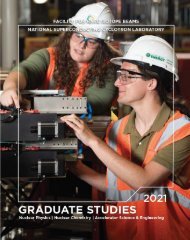202 FRIB Graduate Brochure
Create successful ePaper yourself
Turn your PDF publications into a flip-book with our unique Google optimized e-Paper software.
Heiko Hergert<br />
Associate Professor of Physics<br />
Keywords: Nuclear Structure, Many-Body Theory, Computational Physics,<br />
Machine Learning, Fundamental Symmetries.<br />
Theoretical Nuclear Physics<br />
About<br />
• PhD, Physics, TU Darmstadt, Germany, 2008<br />
• Joined the laboratory in 2014<br />
• hergert@frib.msu.edu<br />
Research<br />
Atomic nuclei are among nature’s most fascinating, and<br />
at the same time, most confounding objects. They exhibit<br />
a rich variety of quantum phenomena, especially if their<br />
proton and neutron numbers are heavily unbalanced.<br />
Through numerical simulations of nuclei, and their<br />
confrontation with the wealth of new experimental data<br />
that <strong>FRIB</strong> will produce, my group seeks to deepen our<br />
understanding of nuclear interactions and the quantum<br />
mechanics of strongly correlated many-body systems.<br />
This will help us to answer scientific questions ranging<br />
from the validation of nature’s fundamental symmetries<br />
at the smallest scales to the life and death of stars and the<br />
origin of elements in the cosmos. On a very practical level,<br />
simulations of the structure, dynamics, and chemistry of<br />
the nuclei that <strong>FRIB</strong> is capable of producing will provide<br />
important guidance for fundamental experiments, as well<br />
as the harvesting of isotopes for use in medicine or other<br />
societal applications.<br />
Biography<br />
I grew up on a farm in a small town in the German state of<br />
Hesse, but my interest in science led me to pursue a career<br />
in research. In 2008, I received my doctoral degree from the<br />
Technical University in Darmstadt, Germany, specializing<br />
in nuclear many-body theory. After postdoctoral stays at<br />
MSU’s National Superconducting Cyclotron Laboratory<br />
(the predecessor of <strong>FRIB</strong>) and The Ohio State University,<br />
I returned to Lansing as an <strong>FRIB</strong> Theory Fellow in 2014,<br />
and joined the faculty in the following year. In addition<br />
to computational nuclear physics, I also have research<br />
interests and collaborations in general topics of scientific<br />
computing, like machine learning or quantum computing.<br />
How Students can Contribute as Part<br />
of my Research Team<br />
My group’s work focuses on the development of novel<br />
techniques for tackling the nuclear many-body problem,<br />
and their implementation on computers ranging from small<br />
workstations to massively parallel supercomputers. Students<br />
will receive training in state-of-the-art methods of quantum<br />
many-body theory and high-performance computing.<br />
Our projects typically focus on the development of new<br />
extensions to our methods and their application, often in<br />
close collaboration with experimental researchers at <strong>FRIB</strong><br />
and other facilities. This offers prospective students a broad<br />
perspective of the field, and a chance to be immersed in<br />
community efforts like the <strong>FRIB</strong> Theory Alliance or the<br />
NUCLEI SciDAC project.<br />
Selected Publications<br />
Ab Initio Treatment of Collective Correlations and the<br />
Neutrinoless Double Beta Decay of 48Ca, J. M. Yao, B.<br />
Bally, J. Engel, R. Wirth, T. R. Rodriguez and H. Hergert,<br />
Phys. Rev. Lett. 124, 232501 (<strong>202</strong>0)<br />
Non-Empirical Interactions for the Nuclear Shell Model:<br />
An Update, S. R. Stroberg, H. Hergert, S. K. Bogner, and J.<br />
D. Holt, Ann. Rev. Nucl. Part. Sci. 69, 307 (2019)<br />
In-Medium Similarity Renormalization Group Approach to<br />
the Nuclear Many-Body Problem, in “An Advanced Course<br />
in Computational Nuclear Physics’’ (eds.~M. Hjorth-<br />
Jensen, M. P. Lombardo, U. van Kolck), Springer Lecture<br />
Notes in Physics 936 (2017)<br />
52<br />
<strong>202</strong>2_<strong>FRIB</strong>_<strong>Graduate</strong>_<strong>Brochure</strong>v4.indd 52<br />
10/29/<strong>202</strong>1 3:33:52 PM






